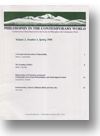|
1.
|
Philosophy in the Contemporary World:
Volume >
3 >
Issue: 1
Nancy J. Annaromao
A Feminist Interpretation of Vulnerability
abstract |
view |
rights & permissions
| cited by
Under patriarchy, the rationally autonomous agent engages in contractual relations in a marketplace society. The contractual model reinforces a negative conception of the vulnerable as weak and as susceptible to injury and exploitation. Recent feminist writing has a positive notion of vulnerability that is in conflict with contractualism. Positive notions of vulnerability, the paper argues, are found in Virginia Held’s conception of mothering, Nel Noddings’ analysis of teaching, and Annette Baier’s development of trust as essential for social relationships.
|
|
|
2.
|
Philosophy in the Contemporary World:
Volume >
3 >
Issue: 1
Mark J. Doorley
The Teaching of Ethics
abstract |
view |
rights & permissions
| cited by
The most important philosophy course that contemporary undergraduates may take is ethics. Concerned with how to live a human life, ethics becomes ever more urgent as life unfolds. As the teacher, a philosopher likely wonders about the interaction in the classroom. This paper explores that interaction. Taking a cue from Aristotle, it is argued that the teaching of ethics is an invitation to self-reflection and self-responsibility, more so than a passing on of a set of ethical principles or laws.
|
|
|
3.
|
Philosophy in the Contemporary World:
Volume >
3 >
Issue: 1
Cassandra L. Pinnick
Epistemology of Technology Assessment:
Collingridge, Forecasting Methodologies, and Technological Control
abstract |
view |
rights & permissions
| cited by
This paper criticizes Coliingridge’s arguments against an epistemology of technological control. Collingridge claims that because prediction mechanisms are inadequate, his “dilemma of control” demonstrates that the sociopolitical impact of new technologies cannot be forecasted, and that, consequently, policy makers must concentrate their control measures on minimizing the costs required to alter entrenched technologies. I argue that Collingridge does not show on either horn that forecasting is impossible, and that his criticisms of forecasting methods are self-defeating for they undercut his positive case for the control of entrenched technologies. Finally, I indicate an empirical base for forecasting risk that may define epistemic principles of technology assessment.
|
|
|
4.
|
Philosophy in the Contemporary World:
Volume >
3 >
Issue: 1
Peg Tittle
Sexual Activity, Consent, Mistaken Belief, and Mens Rea
abstract |
view |
rights & permissions
| cited by
The gendered subcultures of our society may have different value systems. Consequently, sexual activity that involves members of these subcultures may be problematic, especially concerning the encoding and decoding of consent. This has serious consequences for labelling the activity as sex or sexual assault. Conceiving consent not as a mental act but as a behavioural act (that is, using a performative standard) would eliminate these problems. However, if we remove the mental element from one aspect, then to be consistent we must remove it from all; and, as a result, the “mistaken belief” defense would be eliminated and mens rea would become insignificant (in other words, if what the woman means is irrelevant, then what the man believes or intends should also be irrelevant). This consequence suggests major changes to our current conceptions of legal justice, which changes, if undesirable, prompt reconsideration of the initial proposal to use a performative standard for consent.
|
|





